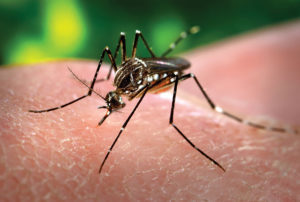DENGUE FEVER
by Sheila Marie Sacayle
During this time of COVID-19 while the world is obsessed by the terrible pandemic it is important to remember that here in Thailand Dengue Fever poses another real threat. It is a virus that affects thousands throughout the nation’s 77 provinces and can sometimes be fatal. So, here is an article to remind ourselves of the dangers during these wettest of rainy season months when Dengue fever can be post prolific. …..Ed
world is obsessed by the terrible pandemic it is important to remember that here in Thailand Dengue Fever poses another real threat. It is a virus that affects thousands throughout the nation’s 77 provinces and can sometimes be fatal. So, here is an article to remind ourselves of the dangers during these wettest of rainy season months when Dengue fever can be post prolific. …..Ed
Mosquito-borne diseases are common in Southeast Asian countries, particularly during the wet season or monsoon. One of them is Dengue Fever and it has become one of the most widespread mosquito-borne diseases in the world.
[Dengue’ Dengue is a disease caused by any one of the four closely-related dengue viruses (DENY-1, DENV-2, DENV-3, DENV-4). It is a severe, flu-like illness that affects infants, young children and adults.Transmission
The dengue virus is primarily transmitted to humans via the bite of an infected mosquito from the genus Aedes. Of these species, the primary vector or principal transmitter of the dengue virus is the species Aedes aegypti. Dengue cannot be spread directly from one person to another. Mosquitoes are necessary for the transmission of the dengue virus.
When a mosquito bites a person who has dengue virus in his/her blood, the mosquito becomes infected with the dengue virus and the infected mosquito can later transmit that virus to healthy people by biting them.
SYMPTOMS
Dengue Fever should be suspected when a person has a sudden onset of high fever (above 40°C/104°F) that persists for five days. The principal symptoms of Dengue Fever are high fever, severe headache, pain behind the eyes, joint pain, muscle and bone pain and skin rash. However, all of the symptoms may not be present. There are people who are infected with the virus but do not show or suffer any signs or symptoms of the disease.
Most cases are fairly mild and people can recover within a week or so. After a person has recovered from dengue fever, he/she has immunity to the virus that infected him/her but not to the other three dengue viruses. In some cases, however, symptoms worsen and become life-threatening, especially if unrecognised and not properly treated in a timely manner.
Diagnosing dengue fever can be difficult because its signs and symptoms can easily be confused with those of other diseases. Dengue Hemorrhagic Fever, a more severe form of dengue infection, can occur and cause severe bleeding, sudden drop in blood pressure, and death. People with weakened immune systems, as well as those with subsequent dengue infections, are believed to be at greater risk for developing Dengue Hemorrhagic Fever.
Treatment
Because Dengue Fever is caused by a virus, there is no commercially available vaccine or any specific antibiotic to treat it. For mild Dengue Fever, the treatment is toward relief of the symptoms, like taking pain relievers and drinking plenty of fluids to prevent dehydration and close monitoring to ensure there is no bleeding. However, it is important to seek medical attention when symptoms persist.
Prevention
Dengue is common in urban and semi-urban areas with tropical and sub-tropical climates worldwide. There can be sudden outbreaks which occur primarily in areas where the Aedes aegypti mosquitoes live. These mosquitoes often breed in stagnant water where people reside and flourish during rainy seasons. They can also breed in water-filled pots, water containers, tin cans, rainwater tanks and others. Because of urbanization and rapid population growth, there is a problem with sewage and sanitation systems and these can lead to an abundance of breeding sites for the mosquito vectors.
Prevention of dengue can be sought by reducing the habitats and the number of mosquitoes in the surroundings. It is advised that people need to drain water from their water storage containers everyday, and dispose of solid waste properly. Also, limit exposure to bites, wear protective clothing like long sleeves, use mosquito repellents, stay in well-screened houses and avoid being outdoors when more mosquitoes are out.
Another factor that puts people at risk for dengue infection is human migration. The virus can be introduced to other areas by travellers who become infected while visiting areas where dengue commonly exists. It should be noted that one mosquito bite can cause the disease and dengue can affect anyone but tends to be more severe in people with compromised or weak immune systems as they are more susceptible to the dengue virus than people with healthy bodies and strong immune systems.
So, prevention is also about strengthening the body’s immune system. With a strong immune system, it can fight the virus that penetrates it during a dengue invasion in the body and will be able to heal itself. In order to strengthen the immune system, it is advised to keep hydrated, eat fruits and vegetables, take vitamins and supplements, regular exercise and good hygiene, among others.
